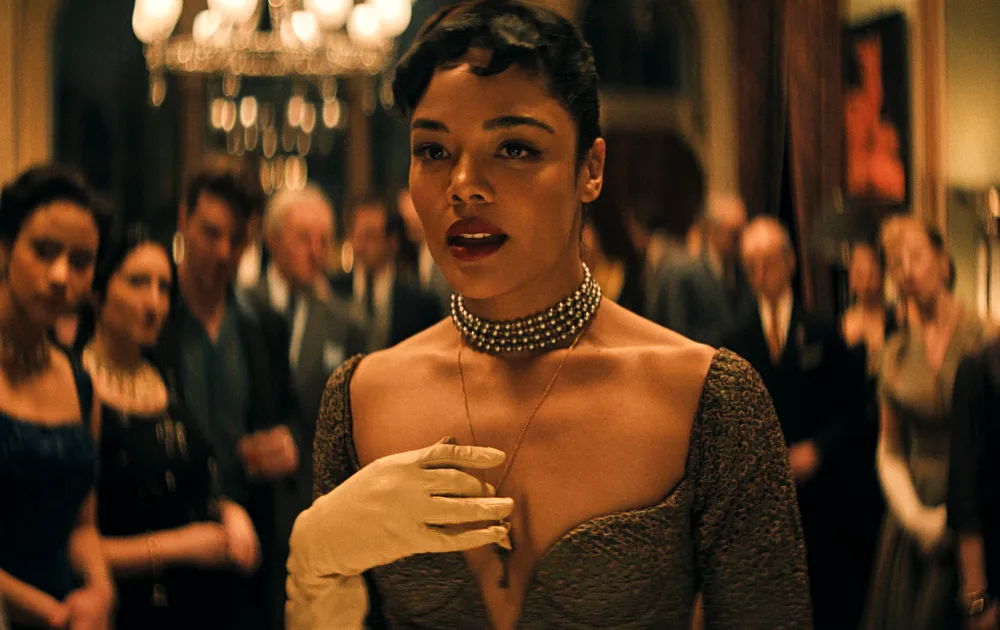Copyright HuffPost

In nearly every film Nia DaCosta has helmed in her short yet accomplished career, the filmmaker has always found a weighty subject to tackle in pursuit of understanding. In her auspicious 2018 debut, “Little Woods,” DaCosta told a story of women navigating life in poor rural America to confront the opioid crisis and pressing issues in women’s health care. In 2021, her acclaimed remake of “Candyman” examined how a history of racial violence against Black men gave rise to the chilling urban legend. And in her latest cinematic turn, “Hedda,” a provocative reimagining of Henrik Ibsen’s 1891 play, the writer-director finds herself exploring the ways that women find agency in a world where race, gender, class and sexual identity can complicate that autonomy. Advertisement According to DaCosta, the inspiration for her years-in-the-making adaptation stemmed from a query she often grapples with. “What really is freedom?” the filmmaker posed during our recent Zoom interview. “I think, especially as a Black person in America, that’s a really important and really dynamic question.” It’s certainly a fair one to ask in today’s time. Perhaps an even better one to ask in a day and age when the concept of freedom seemed just as fragile, like the postwar era of 1950s England, in which DaCosta’s “Hedda” is set — or as the director refers to it, the “Great Age of Pretending.” Advertisement “After the horrors of WWII, there was a moment of trying to snap everything back in place,” DaCosta writes in her film’s production notes, referencing the repressed time of women being pushed out of the workforce for returning servicemen in an effort to get society back to some sense of normalcy. “It was too terrifying to reckon with all that happened, so instead, there was a collective delusion that everything was fine,” DaCosta added. “But it wasn’t real, and it was suffocating for many people.” Advertisement That conflict and historical framework set the scene for DaCosta’s “Hedda,” which stars Tessa Thompson as the titular restless housewife, who feels trapped by her marriage, scandal, societal expectations and a world in which she can’t live on her own terms. In the twisted thriller, out now on Prime Video, Hedda is newly married to her husband, George (Tom Bateman), and bored out of her mind with her current life. On the night of her lavish dinner party, Hedda’s discontent threatens to erupt when her former flame, Dr. Eileen Lövborg (played superbly by Nina Hoss), reappears with her new girlfriend/assistant, Thea (Imogen Poots), as another lover, Judge Roland Brack (Nicolas Pinnock), sniffs around hoping to seduce Hedda, or worse. It’s in these few subtle ways that DaCosta’s fresh interpretation helps the audience understand the circumstances that have bound Hedda and why she’s so prone to resorting to unhinged tactics to get what she truly desires: freedom. Advertisement But the journey there is as messy as she is. Hence, the unruly evening of mayhem and madness that unfolds in “Hedda,” mainly the title character’s doing. She manipulates, cheats, betrays, and cuts down anyone or anything in her path as a result of the limitations that have been placed on her, both by herself and others. All of these charged facets DaCosta found “fascinating” enough to explore in her own bold way onscreen because she knew audiences would likely find Hedda just as intoxicating and relatable as she did when she first read Ibsen’s play. “It was almost like seeing a shadow out of the corner of your eye and chasing that shadow,” the director told me of what she found most compelling about Hedda. “And that was sort of what I wanted to do with my adaptation. I want people to chase the shadow a little bit, or a lot, actually. And in so doing, find parts of themselves that maybe they need to attend to so that they don’t end up becoming as volatile as our dear Hedda.” Advertisement “Hedda” reunites DaCosta and Thompson for a third collaboration after 2018’s “Little Woods” and 2023’s “The Marvels,” the latter of which is the last film that DaCosta worked on before setting her sights back on her mid-20th-century-set adaptation. She first drafted the screenplay for her latest film in 2018 but decided to hold onto it until the timing felt right. As it turned out, DaCosta’s period piece offered the perfect opportunity to tap back into her creative instincts after working with the monster Marvel machine on her third feature ever — a project that also made her the youngest person and the first Black woman to direct an MCU film. Advertisement “I absolutely needed to find myself as a filmmaker and to find my voice in a more acute way,” DaCosta shared of the experience. “So that I could take that same energy onto the next thing — no matter whether it was something that was personal to me or a bigger franchise.” In many respects, “Hedda” was a deeply personal endeavor for DaCosta. The filmmaker aimed for her daring take on Ibsen’s “Hedda Gabler,” “one of the great Bad Girl tales of all time,” to be as captivating as the enigmatic title character. But just as importantly, she wanted her film to serve as a mirror that reflects a universal struggle among many women: the desire to be seen and understood by the world while we strive to understand ourselves. That required making some contemporary changes to Hedda herself — now a queer Black woman in the film — and to the elements that animate her world, such as Eilert being switched to Eileen, a woman, and Thea as her lover. Those new dynamics expanded DaCosta’s portraits of stifled women struggling with internal plight from one to three in her film, something Thompson applauded when she read the former’s screenplay. Advertisement “I loved the changes,” the actor told me, though she said she “didn’t really understand” when DaCosta told her she was interested in doing her own version of “Hedda Gabler” when it’s been “done so much onstage” and “very iconically on film before.” “But as soon as I read her script, I was like, ‘OK, now I see why.’ Because she took the things that excite me about the piece, and really amplified them,” Thompson explained. “Particularly in the change of Eilert to Eileen, she really centered three women on parallel paths to personhood and going about it in very different ways,” the actor continued. “I thought that was so brilliant and also so incredibly modern. And then I understood why we have to make a film of this.” Advertisement When it came to molding this new-age version of Hedda, DaCosta began by picking apart Ibsen’s classic material and constructing her wild heroine from there, choosing only what she deemed necessary for the story she wanted to tell, which is a slight departure from the original play. Unlike Ibsen’s Hedda, who Thompson noted was much clearer about communicating the grandiose things she desired — like saying, “For once, I want to shape a man’s destiny” — DaCosta chose to make her title character more subtle and cunning in her approach. Advertisement “In this, you don’t hear [Hedda] say things like that,” said Thompson. “But you see her try to navigate control over herself, control over the people in the room. And I think it makes for a really fascinating ride.” Indeed, from a viewer’s standpoint, DaCosta’s “Hedda” is more like an odyssey, growing more frenzied by the minute, as the drama eventually becomes a pressure-cooker situation when tensions explode among Hedda’s party guests. In the midst of this, Hedda is busy blowing up her life and hurting those closest to her in her own twisted pursuit of freedom. Still, it makes the five-act film a pretty riveting watch, as Hedda runs around her sprawling English estate like a self-sabotaging agent of chaos, making all kinds of infuriating choices that you wouldn’t be wrong to fault her for. But this is a woman who relishes her bad behavior, hoping it will somehow help her find her way. Advertisement “The expression of this conflict between freedom and a complete lack of it, I thought, was really such a delicious and dangerous and sometimes delightful dance,” Thompson added. In the same breath, “Also a kind of sad one,” she said. It’s not often that we get to see a deeply conflicted and complex character like Hedda onscreen. Rarely are “difficult women” like her given both the nuance and spotlight to exist in and understand their imperfections, especially Black women. That’s what makes DaCosta’s unflinching portrait of Hedda so dynamic. Advertisement She doesn’t shy away from Hedda being an unlikeable heroine on a path of destruction. Instead, the filmmaker leans into the mess as a bit of a challenge to the kind of representation she’s amplifying. “Being comfortable with the mess frees you,” DaCosta pointed out. “It’s a powerful thing to see messy bitches. Not just because they’re messy and crazy, but because it’s channeled through an emotionality and a vulnerability.” DaCosta admits she’s not always comfortable with her own “negative emotions,” the ones that Black women are often taught by society — and even our own community — to hide because we’re meant to be strong instead. However, her curiosity about those feelings, where they come from, how we process and move through them, is what allows Hedda to be a frustrating character who still connects on some level. Advertisement “The mess, me wanting to portray women, and Black women in particular, who aren’t perfect or elegant or noble, is because I want us to be able to have a non-threatening relationship with our darker selves,” DaCosta concluded. TruthHas NoBias Your SupportFuelsOur Mission Your SupportFuelsOur Mission We Won’t Back Down As more major networks align with those in power, the space for fearless journalism is shrinking. By becoming a member, you support a newsroom that asks the tough questions, no matter who’s in charge. We remain committed to providing you with the unflinching, fact-based journalism everyone deserves. Thank you again for your support along the way. We’re truly grateful for readers like you! Your initial support helped get us here and bolstered our newsroom, which kept us strong during uncertain times. Now as we continue, we need your help more than ever. We hope you will join us once again. We remain committed to providing you with the unflinching, fact-based journalism everyone deserves. Thank you again for your support along the way. We’re truly grateful for readers like you! Your initial support helped get us here and bolstered our newsroom, which kept us strong during uncertain times. Now as we continue, we need your help more than ever. We hope you will join us once again. Support HuffPost Already a member? Log in to hide these messages. Advertisement



